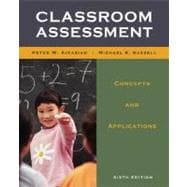
Note: Supplemental materials are not guaranteed with Rental or Used book purchases.
Purchase Benefits
What is included with this book?
| Preface | |
| The Breadth of Classroom Assessment | |
| Purposes of Assessment | |
| Phases of Classroom Assessment | |
| Assessment, Testing, Measuring, and Evaluations | |
| Three General Ways to Collect Data | |
| Student Products, Observation, and Oral Questioning | |
| Standardized and Nonstandardized Assessments | |
| Appopria | |
| Appropriateents: Valid and Reliable Ethical | |
| Issues and Responsibilities | |
| Learning About Students | |
| Early Assessment Gathering | |
| Information about Students | |
| Sources of Information about Students | |
| Forming Student Descriptions | |
| Concerns about Accuracy and Validity | |
| Identifying Special Needs | |
| Improving Early Assessments | |
| Lesson Planning and Assessment Objectives | |
| The Instructional Process | |
| Instructional Planning | |
| Three Levels of Teaching Objectives | |
| Three Domains of Objectives | |
| Stating and Constructing Objectives | |
| Lesson Plans Textbook Objectives and Assessments | |
| State Content Standards Improving the Tie between Planning and Assessment | |
| Assessment During Instruction | |
| Assessment Tasks during Instruction Validity and Reliability in Instructional | |
| Assessment Improving | |
| Assessment during Instruction | |
| Questioning: Purposes and Strategies | |
| Accommodations during Instruction | |
| Summative Assessments | |
| Formative and Summative Assessments | |
| The Logic of Summative Assessments | |
| Planning a Summative Assessment | |
| Preparing Students for Official Assessments | |
| Creating Achievement Tests | |
| Selection and Supply Test | |
| Items Higher-Level Questions | |
| Guidelines for Writing and Critiquing Test Items | |
| Improving Achievement Tests | |
| Assembling Tests | |
| Administering Tests | |
| Issues of Cheating Scoring Paper-and-Pencil Tests | |
| Analying Item Validity Discussing Test | |
| Results wAnalyzingents Universal | |
| Design and Test Accommodations | |
| Performance Assessments | |
| The General Role of Performance Assessments | |
| Performance Assessment in Schools Developing | |
| Performance Assessments | |
| Anecdotal Records, Checklists, and Rating Scales | |
| Rubrics Portfolios Validity and Reliability of Performance Assessments | |
| Grading Rationale and Difficulties of Grading | |
| Grading as Judgment Four Types of Comparison for Grading | |
| Grading for Cooperative Learning and Students with Disabilities | |
| Deciding What to Grade Summarizing Various Types of Assessment | |
| Two Approaches to Assigning Grades | |
| Other Methods of Reporting Student Progress | |
| Commercial Standardized Achievement Tests | |
| How Commercial Achievement Tests are Created | |
| Administering the Test | |
| Interpreting Scores Three Examples of Test | |
| Interpretation The Validity of Commercial Achievement Tests | |
| Computer-Based Technology and Classroom Assessment | |
| Growth of Educational Technology | |
| Computers and the Instructional Process | |
| Computers are Toolboxes Computers and Assessment | |
| During Instruction Computers and Summative | |
| Assessment Classroom Assessment: Summing Up | |
| Standards for Teacher Competence in Educational Assessment of Students | |
| Taxonomy of Educational Objectives (Major Categories and Illustrative Objectives) | |
| Sample Individual Education Plan | |
| Statistical Applications for Classroom Assessment | |
| Some Resources for Identifying Special Needs | |
| Glossary | |
| References | |
| Name Index | |
| Subject Index | |
| Table of Contents provided by Publisher. All Rights Reserved. |
The New copy of this book will include any supplemental materials advertised. Please check the title of the book to determine if it should include any access cards, study guides, lab manuals, CDs, etc.
The Used, Rental and eBook copies of this book are not guaranteed to include any supplemental materials. Typically, only the book itself is included. This is true even if the title states it includes any access cards, study guides, lab manuals, CDs, etc.